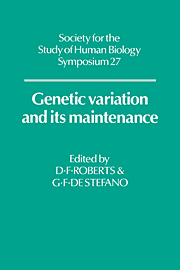Book contents
- Frontmatter
- Contents
- Preface
- Part I Genetic Diversity - Its Dimensions
- Part II Genetic Diversity - Its Origin and Maintenance
- GENETIC DIVERSITY - APPLICATIONS AND PROBLEMS OF COMPLEX CHARACTERS
- Significance of dermatoglyphics in studies of population genetic variation in man
- Polymorphisms of red-green vision among populations of the tropics
- Reductions in body size and the preservation of genetic variability in tropical populations
- Genetic isolates and the search for causal mechanisms of disease
- Index
Reductions in body size and the preservation of genetic variability in tropical populations
Published online by Cambridge University Press: 05 March 2012
- Frontmatter
- Contents
- Preface
- Part I Genetic Diversity - Its Dimensions
- Part II Genetic Diversity - Its Origin and Maintenance
- GENETIC DIVERSITY - APPLICATIONS AND PROBLEMS OF COMPLEX CHARACTERS
- Significance of dermatoglyphics in studies of population genetic variation in man
- Polymorphisms of red-green vision among populations of the tropics
- Reductions in body size and the preservation of genetic variability in tropical populations
- Genetic isolates and the search for causal mechanisms of disease
- Index
Summary
INTRODUCTION
Among the human populations of the world, those of the tropics are currently experiencing the highest mortality and fertility rates (Table 1) so that population turnover is generally rapid. The characteristic combination of high mortalities and high fertilities, so different from the situation in Western countries, maximizes the opportunity for natural selection influence. For under such circumstances, strong selection against specific phenotypic characteristics should produce altered gene frequencies. Where strong and persistent selection continues over many generations, it would be anticipated that genetic diversity would be diminished.
Comparison of mortality statistics for men and women in developing countries with those observed in the industrialised nations shows further differences. For instance in 1978, male and female life expectancies in both U.S.A. and Canada were approximately 69 and 76 years respectively, and 73 and 79 years in Iceland (United Nations, 1978), quite a large difference between the sexes. In developing countries (Table 1, columns 2 and 3) there is a very small difference in the life expectancies of males and females, in a few cases even a reversal of the sex trend seen in industrialised areas. A clue to the reason can be found in the fertility and mortality statistics (columns 4 and 7). In developing countries, where pre- and peri-natal care of both the infant and mother are often minimal, the children are at risk early in life and the mother inearly adulthood. For instance, deaths per thousand in the Western industrial countries average about 9 compared to more than 25 in Upper Volta.
- Type
- Chapter
- Information
- Genetic Variation and its Maintenance , pp. 253 - 262Publisher: Cambridge University PressPrint publication year: 1986

